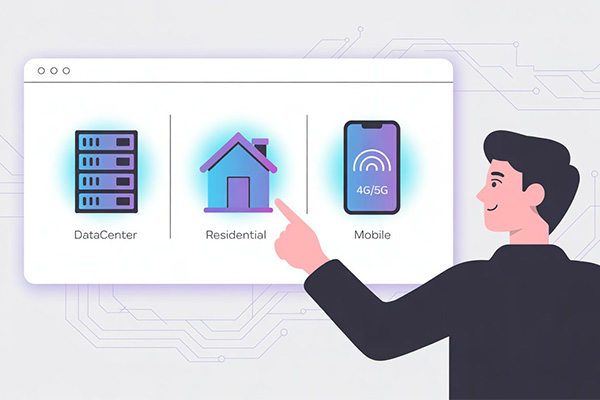Datacenter Proxies, Residential Proxies And Mobile Proxies: Key Differences, Pros & Cons
If you’re a serious internet user, you might eventually need to access a website or server repeatedly — for tasks like:
Data scraping
Price comparison
SEO monitoring
Managing multiple social media accounts
In such cases, proxies help you avoid IP blacklisting and CAPTCHA roadblocks while keeping your location private.
A proxy server acts as a middleman between you and the website you visit, masking your real IP address and location. Let’s break down the three main types of proxies — datacenter, residential, and mobile — along with their advantages, disadvantages, and best use cases.

What Are Datacenter Proxies?
Definition: Datacenter proxies are IPs generated by cloud hosting providers. They’re not linked to an Internet Service Provider (ISP) but instead come from powerful servers.
Best for:
Streaming geo-restricted content (e.g., Netflix)
Torrenting
General high-speed browsing
Pros:
🚀 Fast speeds — optimized hardware & top-tier connectivity
💰 Low cost — cheapest among proxy types
📍 Often located near undersea internet cables for better latency
Cons:
❌ Easier to detect and block — often blacklisted by websites with anti-bot systems
🌍 Limited location diversity — most providers cover only a few countries
🔍 Lower anonymity compared to residential/mobile proxies
Read more about Datacenter Proxies▼
What Are Residential Proxies?
Definition: Residential proxies use IP addresses assigned by ISPs to real homes or offices, making them appear like genuine internet users.
Best for:
Bypassing website restrictions
Sneaker bots & ticket purchasing
General browsing with higher trust
Pros:
🛡 Better anonymity — less likely to be blocked
✅ Appear organic to most websites
🌐 Good balance of speed, reliability, and security
Cons:
💸 More expensive than datacenter proxies
🐢 Slower speeds than datacenter proxies
📊 Not ideal for large-scale high-speed automation
Read more about Residential Proxies▼
What Are Mobile Proxies?
Definition: Mobile proxies route traffic through devices connected to 3G, 4G, or 5G mobile networks.
Best for:
Managing multiple social media accounts
Avoiding detection on platforms with strict security (e.g., Facebook, Instagram)
Pros:
🔄 Constant IP rotation — reduces blocking risk
🛡 Hardest to detect — mimics natural user behavior
📱 Ideal for social media automation
Cons:
💰 Most expensive option
📍 Location may shift — less stable for long-term sessions
🐢 Slower speeds compared to datacenter proxies
Read more about Mobile Proxies▼
Comparison Table: Datacenter vs Residential vs Mobile Proxies
| Feature | Datacenter Proxies | Residential Proxies | Mobile Proxies |
|---|---|---|---|
| Speed | 🚀 Very Fast | ⚡ Moderate | ⏳ Slow–Moderate |
| Security | 🔓 Low | 🔐 High | 🔐🔐 Very High |
| Reliability | ⚠️ Moderate | ✅ High | ✅✅ Very High |
| Cost | 💰 Cheapest | 💵 Moderate | 💎 Most Expensive |
| Detection Risk | ❌ High | ⚠️ Low | ✅ Lowest |
| Best Use | Streaming, torrenting | Web scraping, restricted sites | Social media management, high anonymity |
Quick Takeaways (TL;DR)
Datacenter proxies = Fast + cheap but easier to detect
Residential proxies = Balanced choice, harder to block
Mobile proxies = Most secure & hardest to detect but expensive
FAQs
Which type of proxy is best for speed?
Datacenter proxies are the fastest due to optimized server infrastructure.
Which proxy is hardest to detect?
Mobile proxies are the hardest to block because they use IPs from real mobile networks.
Which proxy should I use for social media automation?
Mobile proxies are the safest choice for managing multiple accounts without triggering platform security systems.